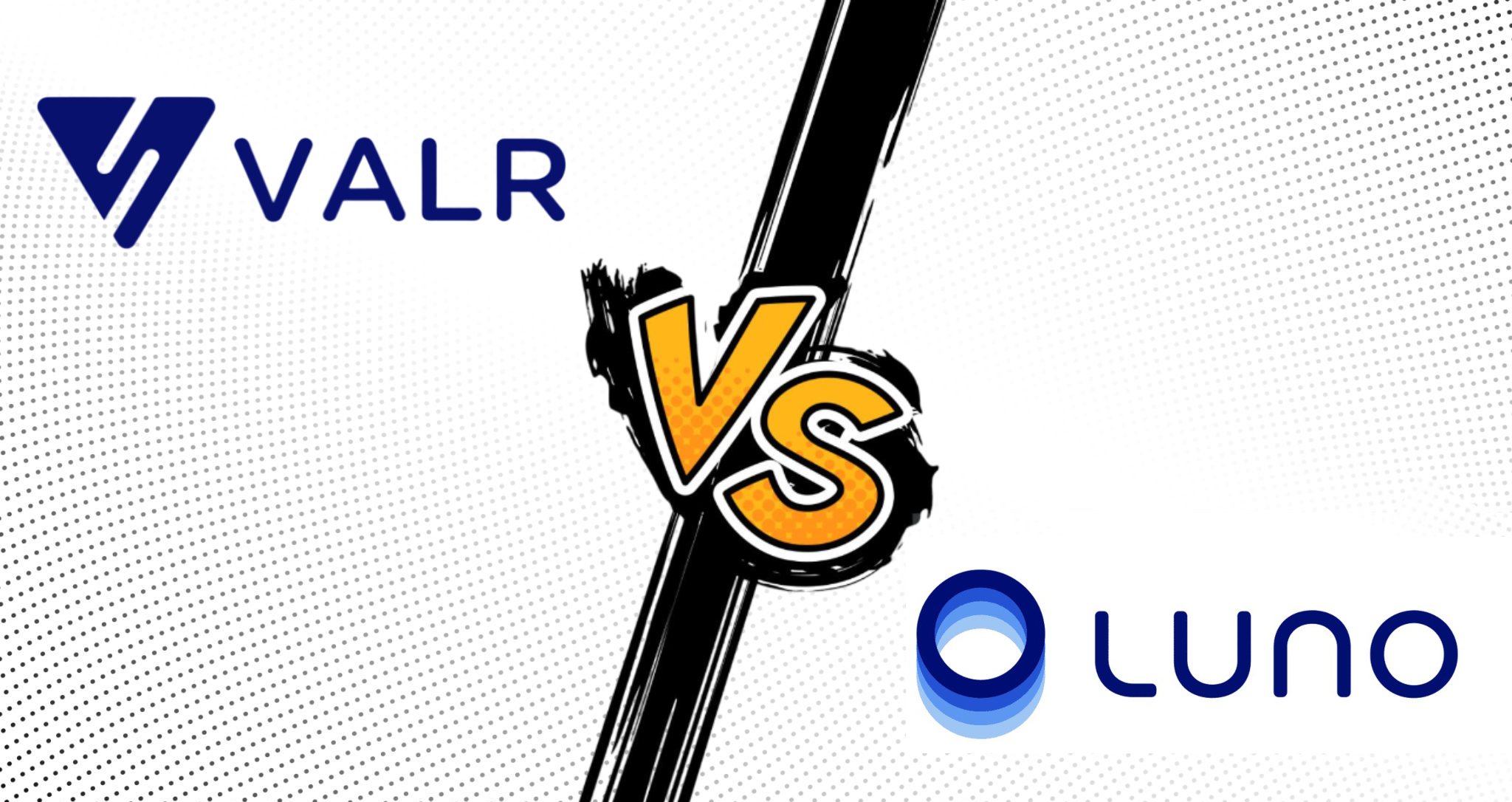
Struggling to choose between VALR and Luno for your cryptocurrency trading? VALR and Luno are two of the most prominent cryptocurrency exchanges serving the South African market.
VALR is a leading cryptocurrency exchange that offers a secure and user-friendly platform for trading a wide range of digital assets. Established in 2019, VALR has quickly gained a reputation for its low trading fees, extensive cryptocurrency offerings, and robust security measures.
On the other hand, Luno is another prominent crypto exchange operating in South Africa and several other countries. Founded in 2013, Luno has been at the forefront of cryptocurrency adoption, providing a user-friendly platform for buying, selling, and storing digital assets.
While both platforms have established themselves as go-to destinations for local investors looking to buy, sell, and trade digital assets, some key differences between them are worth exploring.
In this comparison of VALR vs Luno, we’ll break down the key factors, including fees, coin selections, security measures, customer service, regulation, and user experience.
VALR VS Luno – At a Glance
| Feature |  |
 |
|---|---|---|
| Trading Fees | Maker fees as low as -0.01% – Taker fees from 0.03% to 0.1% | Taker fee: 0.6% – Maker fee: 0.4% (lowest tier) |
| Cryptocurrencies Supported | 75+ | 18 |
| Security | Cold storage, 2FA, insurance | Cold storage, 2FA, insurance |
| Customer Support | 18 hours/day | Online ticketing and email-based support |
| Regulation | FSCA, EU licensing | FSCA, Licensed in multiple countries |
| Deposit/Withdrawal Options | Free & instant ZAR transfers (EFT), Fast Withdrawal option | Instant deposits & express withdrawals |
| Ease of Use (Web & Mobile) | User-friendly for all levels | Suitable for beginner traders |
VALR vs Luno – Regulation
- VALR is fully licensed by South Africa’s Financial Sector Conduct Authority (FSCA) to operate as a cryptocurrency exchange. Additionally, VALR has obtained regulatory approval to offer its services in the European Union, expanding its geographic reach.
- In comparison, Luno is licensed and registered to provide cryptocurrency services in multiple jurisdictions beyond just South Africa, including Australia, Europe, Nigeria, Malaysia, Indonesia, and Uganda. This demonstrates that Luno’s licensing and regulatory oversight extends across several key markets, not just its home market of South Africa.
Winner: Both – The fact that both VALR and Luno have obtained comprehensive regulatory approvals from authorities in their respective operating countries provides an added layer of assurance and legitimacy for crypto traders in South Africa.
VALR vs Luno – Security

- VALR stores the majority of customer funds in secure offline cold storage and requires two-factor authentication for all account access. The exchange also maintains comprehensive insurance coverage to protect against potential breaches or theft of assets.
- Luno claims to store 95% of customer crypto funds in “deep freeze” multi-signature wallets protected by multiple layers of encryption. The platform also requires two-factor authentication and maintains insurance coverage to safeguard users’ digital assets.
Winner: VALR – VALR and Luno utilize industry-standard security practices, such as cold storage and two-factor authentication, to protect their customers’ funds. However, VALR provides additional transparency by specifying that it stores the majority of assets offline, whereas Luno’s claim of 95% in “deep freeze” wallets is less detailed.
VALR vs Luno – Ease of Use (Web and Mobile)
- VALR’s trading platform is designed to provide a seamless and user-friendly experience, whether accessed through the web or mobile app. The clean and intuitive interface makes it easy for both beginner and experienced traders to navigate the platform, place orders, and manage their portfolios effectively. VALR’s mobile app, available for both iOS and Android devices, offers a consistent and responsive experience, enabling users to trade and monitor their crypto assets on-the-go with ease.
- In comparison, Luno’s web and mobile platforms prioritize a more minimalistic approach, which could appeal to those seeking a more basic and beginner-friendly trading experience, but may be less suitable for users seeking more robust and customizable tools.
Winner: Both – Luno and VALR’s trading platforms, both web and mobile, strike a balance between simplicity and advanced functionality, making them accessible to a wide range of users, from novice traders to experienced investors.
Luno vs VALR – Cryptocurrencies Supported

- VALR offers over 75 cryptocurrencies, including major assets like Bitcoin and Ethereum, as well as numerous emerging digital currencies.
- In contrast, Luno supports a total of 18 cryptocurrencies for their South African customers, including Bitcoin, Ethereum, Ripple, Litecoin, Bitcoin Cash, and a few other prominent digital assets.
Winner: VALR – While Luno’s selection covers some of the largest and most well-established cryptocurrencies, it is significantly more limited compared to the extensive 75+ crypto offering on VALR.
Luno vs VALR – Trading Fees
- VALR offers highly competitive trading fees, with maker fees as low as -0.01% (they actually pay you) and taker fees ranging from just 0.03% to 0.1%, depending on the asset class. Importantly, VALR does not charge any monthly account fees, management fees, or cryptocurrency storage fees, providing a more cost-effective trading experience.
- In comparison, Luno’s trading fees are generally higher. Luno charges a 0.6% taker fee and 0.4% maker fee for their lowest volume tier. They also levy additional fees, such as a 2% annual “bundle tracking fee” for their crypto bundles, as well as crypto send fees that fluctuate based on blockchain network congestion. These extra charges add to the overall costs for Luno users.
Winner: VALR – VALR provides a more affordable cryptocurrency trading platform, with lower core trading fees and the absence of various account-related charges that Luno imposes on its customers.
VALR vs Luno – Deposit/Withdrawal Options
- VALR makes it incredibly simple for South African users to deposit and withdraw funds, offering free and instant ZAR transfers via EFT. The exchange also features a “Fast Withdrawal” option that enables instant Rand payouts, further enhancing the user experience.
- Luno also supports ZAR deposits and withdrawals, but its selection of local payment methods is more limited compared to VALR. Luno offers free bank transfers (EFT) for deposits, as well as instant deposits and express withdrawals, but charges fees for these services, unlike VALR’s free options.
Winner: VALR – The key difference is that VALR provides South African users with a more comprehensive and cost-effective range of deposit and withdrawal options, including free and instant ZAR transfers, as well as the convenient “Fast Withdrawal” feature. In contrast, while Luno supports standard ZAR deposits and withdrawals, it charges fees for some of these services and has a more limited selection of payment methods compared to VALR.
VALR vs Luno – Customer Support
- VALR provides 18 hours of dedicated online customer support per day through its ticketing system, allowing users to promptly address any issues or inquiries. Beyond the standard support channels, VALR also offers private support services tailored specifically for its corporate and institutional clients, ensuring a heightened level of personalized assistance.
- In contrast, Luno’s customer support is primarily limited to an online ticketing system and email-based communication. While Luno does not have a dedicated phone number for users, their support is responsive.
Winner: VALR – VALR offers a more robust and accessible customer support infrastructure, with extended support hours and specialized assistance for its corporate and institutional users, while Luno’s support is primarily restricted to online ticketing and email communication.
Luno versus VALR – Which Should You Choose
From this comparison of VALR versus Luno, it’s clear that each cryptocurrency exchange has its own unique strengths and advantages.
VALR stands out with its more competitive pricing structure, featuring lower trading fees and the absence of monthly or storage charges. Additionally, VALR offers a significantly wider selection of cryptocurrencies, including both major and emerging digital assets, giving users greater flexibility to diversify their portfolios. Underpinning these benefits is VALR’s robust regulatory standing, with licenses from both the South African FSCA and the European Union, providing an added layer of trust and security.
On the other hand, Luno may be the more streamlined and user-friendly option, particularly for beginner crypto investors. The exchange’s simplified interface and focus on the largest, most established digital currencies like Bitcoin and Ethereum could be a better fit for those just starting their journey into the world of digital assets.
So which crypto exchange should you go for?
Well, the choice between VALR and Luno will depend on the individual needs and preferences of the South African trader. Those seeking a wider selection of cryptocurrencies, more competitive pricing, and stronger regulatory oversight may find VALR to be the better fit. Conversely, crypto newcomers or those prioritizing ease of use may be drawn to the simplicity and familiarity of the Luno platform.
FAQs
- Which exchange has lower trading fees, VALR or Luno?
VALR offers significantly lower trading fees compared to Luno. VALR’s maker fees can be as low as -0.01% (meaning you get paid to provide liquidity), while their taker fees range from just 0.03% to 0.1%. In contrast, Luno charges a 0.6% taker fee and 0.4% maker fee at their lowest volume tier.
- Does VALR or Luno support more cryptocurrencies?
VALR supports a much wider range of cryptocurrencies compared to Luno. VALR offers trading for over 75 different digital assets while Luno supports 18 cryptocurrencies for South African users.
- Are both exchanges equally secure?
Both VALR and Luno implement industry-standard security measures, such as cold storage for the majority of user funds and two-factor authentication for account access. However, VALR provides more transparency by specifying that it stores the majority of assets offline, while Luno’s claim of 95% in “deep freeze” wallets is less detailed.
- Are VALR and Luno regulated in South Africa?
Yes, both VALR and Luno are regulated cryptocurrency exchanges in South Africa and hold licenses from the FSCA.
- Which exchange has better deposit and withdrawal options?
VALR offers more comprehensive and cost-effective deposit and withdrawal options for South African users. VALR provides free and instant ZAR transfers via EFT, as well as a “Fast Withdrawal” option for instant Rand payouts. Luno supports standard ZAR deposits and withdrawals but charges fees for some services like instant deposits and express withdrawals.
